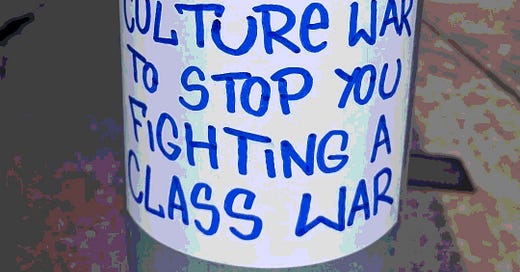I've been having yet another dig around the archives and found this piece which was published on a now deleted Wordpress blog but which for some inexplicable reason, wasn't posted here on Substack. I'm making amends for that now. There have been a few minor edits from the original.
A brief preamble and a definition
I've been thinking about writing a piece on the so called 'culture wars' for some time. What has been putting me off is that the term 'culture wars' has become overused and indeed abused to the point where it's pretty much lost any real meaning. It encompasses a wide range of issues and concerns. So wide that it can be difficult to find any overarching link between them. What follows is an initial examination of a number of issues that have been lumped under the heading of 'culture wars' and an explanation of why that's wrong. Anyway, before I go any further, here's a kind of a definition of what culture wars are which offers some kind of framework for a discussion to proceed:
From Wikipedia:
A culture war is a cultural conflict between social groups and the struggle for dominance of their values, beliefs, and practices. It commonly refers to topics on which there is general societal disagreement and polarization in societal values.
Its contemporary use refers to a social phenomenon in which multiple social groups, holding distinct values and ideologies, attempt to steer public policy in opposition to each other, thus a culture war now describes "hot button" or "polarizing" social issues in politics and public policy.
Contemporary wedge issues include abortion, homosexuality, transgender rights, pornography, multiculturalism, racism and other cultural conflicts based on values, morality, and lifestyle which are described as the major political cleavage.
What happened to class?
In that definition there's not a single mention about class, exploitation or any of the other shite that working class people of all origins, colours, beliefs and sexualities have to put up with day in and day out in their struggle to survive in an increasingly dysfunctional, decrepit and dystopian system. Funny that isn't it? It's almost like they want us at each others throats instead of fighting alongside each other. It's a classic example of the divide and rule tactics being deployed against us. The question is, are we going to be utter mugs and let those pushing an agenda that pits us against each other, or are we going to show them for what they are?
Now it has been argued that the left's obsession with identity politics has fuelled the right's obsession with fighting the culture wars. There's some truth in that, it has to be said but it's not the full story - that is dealt with later on in this piece. The middle class left abandoned the working class a good few decades ago, leaving us to get on with it while they became increasingly obsessed with identity politics and post modernism. With the assault on class solidarity and the increasing atomisation of society from the late 1970s onwards, the writing was on the wall. The set piece battles of the miner's strike and the Wapping dispute in the 1980s were pretty much the last gasp of what was understood as old school class struggle. The middle class left took the defeats of these struggles as the signal they were looking for to turn their backs on us and instead, follow their own obsessions. Did we miss them? Not at all to be honest...
It was from that point of abandonment in the late 1980s that a working class already diversified in parts from the immigration of the 1950s and 60s started to become more diverse with further waves of immigration. For a middle class left growing more obsessed with identity politics, this diversification gave them the opportunity to piggy back genuine struggles against racism and turn them into campaigning and eventually, career opportunities. To no one's real benefit but themselves to be brutally honest.
Actual migrant values versus what's expected of them by the middle class left
That diversification is something we noticed in Thurrock from the mid 2000s onwards. What was interesting to note from our perspective was that when people of African origin started to settle in Thurrock from the mid 200s onwards, a fair few of them had small 'c' conservative values. That manifested itself in a strong belief in the family unit and attendance at church. Not what the middle class left expected or were hoping for from a new wave of migrants!
With the Eastern European migrants who followed, it was more of a mixed picture. Some were devout church goers and possibly, saved a few Catholic churches in Thurrock from having to close. A few, judging by the evidence of stickers we found in places like Grays, were way off on the nationalist right. Some of them weren't shy about racially abusing people of African origin. Most just wanted to earn enough money for a decent life. For some, it was so they could settle here - they were the non-church goers who didn't fancy a return to Poland which arguably, is a bit of a Catholic theocracy. For others, it was simply a case of earning and saving enough money to take back home with them after a few years.
For a middle class left obsessed with identity politics, the migrant community in Thurrock was probably a massive disappointment to them. Which is one reason why, thankfully, we hardly ever felt the malign presence of the middle class left when we operated there.
What it taught us was that you judge people of migrant origin by who they actually are and how they conduct themselves rather than try to force them into a box that fits pre-conceived ideas about how they should behave. From our experience, a fair number of the family orientated, church going people of African origin have views on issues such as sexuality and abortion that do not chime with those of the middle class left. Unsurprisingly, there are a few Conservative councillors of African origin on both Thurrock and Basildon councils.
All of this goes to show that people don't fit into pre-determined boxes and that there's a place for a nuanced understanding of complex situations. One of those boxes is assuming the role of victim which from our experience in Thurrock, we never saw anyone of migrant origin doing. This shows that the 'culture wars' don't always cleave around race or racial identity. As explained here: Could black African Brits be about to go Tory? - Rakib Ehsan | Spiked | 18.5.22. It's complicated...
Fears about rapid change have nothing to do with 'culture wars'
We've written a few pieces about people's reaction to change, their understandable fears of rapid change they have little or no control over and also, the need for a sense of attachment and belonging. Here are some of them: A sense of belonging 4.1.24 and: Reacting to change 15.8.23 and also: Taking a step back in a search for some spiritual depth 11.7.23. The strong religious beliefs of a significant part of the African community in Thurrock is an example of people who, despite moving across the globe for a better life, want to have a degree of stability and continuity in their lives. Obviously, we get that those beliefs may not be acceptable to everyone but the desire to hold onto them does represent a basic human need for stability. The dismissal by some elements of the middle class left of this desire for stability in people's lives as reactionary inevitably creates a political vacuum.
The more we think about our politics which are based on community, a sense of solidarity and bonding within that community and also, a sense of attachment to place and landscape, the more we've come to question whether our politics fit into the left vs right divide. We and quite a few other people have started to question whether seeing politics and social issues through the prism of the left vs right divide is becoming increasingly redundant. That questioning took off when we found ourselves at odds with many comrades, many of them now former comrades, over the response to the Covid crisis. When you start to extricate yourself from the left vs right dichotomy, then some of the issues that get lumped under the culture wars label can be seen in a different light. A fair number of them are concerns and fears about the impact of rapid, forced change and having no control whatsoever over that process.
The problem we have with culture wars is that many still see it as a left vs right thing. Seeing it like that means that issues such as the fears of rapid change, economic, social and cultural, end up being dismissed as 'reactionary'. As we've mentioned earlier, the dismissal of these fears as reactionary inevitably leaves a political vacuum waiting to be filled by some pretty undesirable people. It needs to be noted that having to warn the middle class left and others posing as radical about the dangers of dismissing people's fears about change creating these political vacuums is starting to become pretty bloody wearing to say the least!
The 'ownership' of history
What is history?
Grouping a diverse range of issues under the heading of 'culture wars' only serves to make understanding them more fraught than it should be. I've already had a pop at the middle class left in this piece. It's time to turn the metaphorical guns to those on the other side of the problematic left vs right divide. One such target is David Starkey, the historian. One of those historians who likes to portray the official account of the past as pretty much immutable truth. An attitude that somehow manages to dismiss the inconvenient truth that history is written by the winners. An inconvenient truth that was expertly discussed in E H Carr's excellent What Is History. A book that in my opinion, should be on the reading list for anyone wishing to study history. One aspect of the culture wars is the debate about what history actually is and what purpose it serves. A controversial part of that debate is what to do about statues from the past that people these days, for a variety of issues, have a problem with. To leave or tear down a statue that a substantial number of people dislike or even loathe has become a hot issue in the culture wars.
An example of a 'hot issue' in the culture wars
It's always useful to have an example to discuss, and as I now live near to Bristol, the obvious one that comes to mind is the toppling of the statue of the 17th century slave trader, Edward Colston on Sunday June 7, 2020, after a Black Lives Matter (BLM) protest in the city. This is some useful background to Edward Colston and the significance of his statue and it's toppling and subsequent tumbling into the Floating Harbour: Who was Edward Colston and why was his Bristol statue toppled? 8.7.20. Colston was born in Bristol in 1636 but spent his adult life away from the city. All of his slave trading was conducted in the City of London. The statue to him was was erected in 1895 by the Society of Merchant Venturers (SMV) to commemorate his philanthropy. Not only does the SMV have a bit of a 'difficult' past, they still exert a fair bit of behind the scenes influence over affairs in the city. It's explained here by Mark Steeds of the Bristol Radical History Group: The problematic past of the Merchant Venturers - The Bristol Cable | 26.10.20.
To say there was a lot of huffing and spluttering about the need to defend statues after Colston's one got the mud pack treatment at the bottom of the Floating Harbour was an understatement. Here's just one example of this: A gap-toothed city - David Starkey | The Criric | February 2022. The fact that the toppling took place after a BLM protest did undeniably colour the judgement of many of the critics of the event. Which was pretty convenient for them because they could present this as a straight culture wars issue and ignore the behind the scenes influence the SMV has to this day over the affairs of the city of Bristol. An influence that is far from transparent.
One reading of the toppling of the statue is that many of the participants in and spectators of the action felt that the historical wrong of it being erected in the first place had been corrected. While that's undeniably true, another reading, albeit a complementary one, is that it was an open gesture of defiance to the SMV and a challenge to set about ending their influence in the city. In other words, it was about calling truth to power and questioning the shadowy forces exercising that power. Something that the critics of the toppling seemed only too willing to gloss over when they saw this as merely another episode in the culture wars. Exposing the role of the SMV in the affairs of Bristol is not 'culture wars', it's calling truth to power which is a serious and necessary business.
Staying on the subject of statues, would those spluttering about Colston's statue being dumped in the Floating Harbour be as angry about statues being toppled in an uprising or regime change? Or is is the case that they're just angry that people have had the temerity to challenge their view of history? Do the likes of Starkey feel that their monopoly on the understanding of history is threatened by those at the grassroots who've diligently researched the history of their city and have come to radically different conclusions? We are of course referring to the Bristol Radical History Group. Also, unlike campaigns to remove 'difficult' statues which eventually persuade the authorities to act, Colston was removed by direct action, which in this instance most certainly got a result. What also needs to be pointed out to historians such as Starkey who venerate tradition, well, their version of it, is that there's a long history of the people of Bristol taking to the streets to vent their anger. That's a tradition to be proud of!
A brief conclusion of sorts
As stated in the preamble, this is an initial examination of some of the issues raised by the seemingly indiscriminate use of the 'culture wars' descriptor. I've only cited a few examples and am only too well aware there's more work to be done.
However, hopefully by this point you'll start to see that slapping the label 'culture wars' over a range of issues is constricting how they are thought about, discussed and debated. It's intellectually lazy to lump controversies over issues ranging from migrants wanting to preserve their small 'c' conservative Christian traditions and people desiring a degree of stability and continuity in their lives through to direct action getting rid of a hated statue under one label. All of these issues are contentious and need to be debated but that has to happen in an informed and nuanced way. Attempts to slot them into one side or the other of the culture wars are disingenuous in that it makes the issues tribal and reduces, if not removes altogether any chance of a nuanced discussion. For commentators with intellectual pretensions to do this is frankly, unforgivable.
Is it time to reject the term 'culture wars' and use language that's more relevant to the topic that's being discussed? When we accept the labelling of the term 'culture wars' to discussions about issues that concern us, we're complicit in an agenda of divide and rule. On that basis alone, I'd suggest that the term really does need to be consigned to the dustbin of history without further ado.











